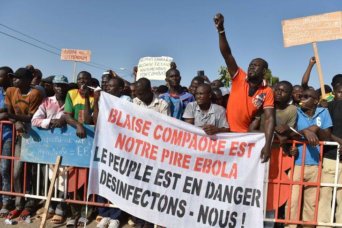- About
- Topics
- Picks
- Audio
- Story
- In-Depth
- Opinion
- News
- Donate
-
Signup for our newsletterOur Editors' Best Picks.Send
Read, Debate: Engage.
On Wednesday (16 September 2015), the Presidential Guard (Régiment de Sécurité Présidentielle, RSP) - a holdover from the dictatorship of Blaise Compaoré - stormed a cabinet meeting of the Transitional Government of Burkina Faso in Ouagadougou, the capital.
Burkina Faso’s transitional government has backed the democratic transition of the country since the fall of Compaoré end of October 2014 and was preparing the first democratic elections, which should take place on 11 October 2015.
A largely peaceful mass movement and protests, especially by the young population of Burkina Faso, had forced Blaise Compaoré in autumn 2014 to resign. Prior and after 27 years in power, he had tried to secure him a second term through a constitutional amendment, but was failed due to the protests of the population and eventually fled to neighbouring Ivory Coast.
Many observers interpreted that the Burkinabe did not accept the constitutional amendment and protested successfully in a non-violent way as a signal that the country is on the road to democracy. Many spoke in reference to the Arab Spring by an "African Spring".
Although in exile, ex-president Blaise Compaoré rules the armed to the teeth and extremely well trained, 1,300 men strong special unit and is responsible for much sorrow in the long-suffering Burkina Faso. Transitional President Kafando, Prime Minister Yacouba Isaac Zida and two ministers have fallen now into the hands of Compaoré's elite unit.
The Burkinabe did respond to the kidnapping of the government with massive demonstrations that were brutally crushed by the RSP. All radio and television stations were under military occupation and stopped the transmissions; journalists were systematically persecuted and mistreated. There were wounded and dead.
The claims of RSP were initially unclear. The worst fears were confirmed on Thursday morning: On Television was announced that the government and the National Council of Transition (Conseil National de la Transition, CNT) were deposed. The by then non-existent Conseil National de la Démocratie (CND) will now rule the country. Shortly thereafter, the internationally known felon and murderer Gilbert Diendéré appointed himself as the President of the CND and thus head of state of Burkina Faso. Gilbert Diendéré is considered the right hand of Blaise Compaoré and among other crimes, the murder of one of the greatest political figures in Africa, the former president of Burkina Faso, Thomas Sankara. At the same, the President of the CNT, Cheriff Sy, applies constitutionally as the legitimate interim president in the absence of the President Kafando.
General Gilbert Diendéré wants to postpone the elections. “Today it seems to me that the October 11 date is too soon to hold the election”, the commander of the presidential guard said in an interview with The Associated Press.
The actions of the military were strongly condemned on international level. UN Secretary General Ban Ki-moon said in New York, the action was outrageous and a violation against the Constitution. The foreign policy chief of the European Union, Federica Mogherini said the developments endangered the transition to democracy in Burkina Faso. French President Francois Hollande condemned the coup and called for the release of detainees and the restoration of the transitional government.
Observers say these testimonies won’t be enough. Actions are needed as the latest political unrests sparked violence in the streets against peaceful demonstrating Burkinabes and the first signs of an “African Spring” seem to become obliterate by an undemocratic and violent coup government.
Read also:
Is Burkina Faso sub-Saharan Africa’s version of the Arab Spring?
